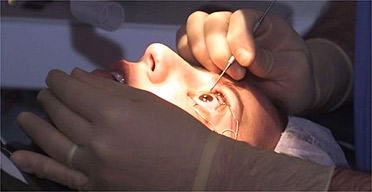Entered into the database on Saturday, June 17th, 2006 @ 15:45:37 MST
Company will only seek licence for medicine that costs 100 times more
A major drug company is blocking access to a medicine that is cheaply
and effectively saving thousands of people from going blind because it wants
to launch a more expensive product on the market. Ophthalmologists around the world, on their own initiative, are injecting tiny
quantities of a colon cancer drug called Avastin into the eyes of patients with
wet macular degeneration, a common condition of older age that can lead to severely
impaired eyesight and blindness. They report remarkable success at very low
cost because one phial can be split and used for dozens of patients. But Genentech, the company that invented Avastin, does not want it used in this
way. Instead it is applying to license a fragment of Avastin, called Lucentis,
which is packaged in the tiny quantities suitable for eyes at a higher cost. Speculation
in the US suggests it could cost £1,000 per dose instead of less than £10.
The company says Lucentis is specifically designed for eyes, with modifications
over Avastin, and has been through 10 years of testing to prove it is safe. Unless Avastin is approved in the UK by the National Institute for Clinical Excellence
(Nice) it will not be universally available within the NHS. But because Genentech
declines to apply for a licence for this use of Avastin, Nice cannot consider
it. In spite of the growing drugs bill of the NHS, it will appraise, and probably
approve, Lucentis next year. Although Nice's role is to look at cost-effectiveness, it says it cannot appraise
a drug and pass it for use in the NHS unless the drug is referred to it by the
Department of Health. The department says its hands are tied. "The drug company hasn't applied for it to be licensed for this use. It
wouldn't be referred to Nice until they have made the first move," said
a Department of Health spokeswoman. "They need to step up and get a licence.
If they are not getting it licensed, why aren't they?" New drugs for the condition are badly needed: those we have now only slow the
progression to blindness. With Avastin, many patients get their sight back with
just one or two injections. Avastin was first used on human eyes by Philip Rosenfeld, an ophthalmologist
in the US, who was aware of animal studies carried out by Genentech that showed
potential in eye conditions. This unlicensed use of Avastin has spread across
continents entirely by word of mouth from one doctor to another. It has now
been injected into 7,000 eyes, with considerable success. Professor Rosenfeld has published his results and a website has been launched
in the US to collate the experiences of doctors from around the world. But although
the evidence is good, regulators require randomised controlled trials before
they grant licences, which generally only the drug companies can afford to carry
out. Prof Rosenfeld said the real issue was drug company profits. "This truly
is a wonder drug," he said. "This shows both how good they [the drug
companies] are and on the flip side, how greedy they are." He would like
to see governments fund clinical trials of drugs such as Avastin in the public
interest. Rising drug bills are a big problem on both sides of the Atlantic. In the UK,
said David Wong, chairman of the scientific committee of the Royal College of
Ophthalmologists, doctors are fighting battles to persuade primary care trusts
to pay for drugs to stop their patients going blind while they wait for Nice
to decide on Lucentis and another expensive drug called Macugen. That decision
is not expected before the end of next year. About 20,000 people are diagnosed with age-related macular degeneration in
the UK each year. "From the patient's point of view, if they have an eye
condition that deteriorates very quickly, there is no question of waiting,"
said Professor Wong. "We're talking about days and weeks, rather than months.
The question is should we do nothing and say there is no randomised controlled
trial to prove Avastin is of value?" He called for primary care trusts
to agree to pay for the planned phasing-in of new drugs for the condition. Last night Genentech said its main concern over the use of Avastin to treat
eye conditions was patient safety. "While there are some small, single-centre,
uncontrolled studies of Avastin being performed, safety data on patients who
are treated with Avastin off-label is not being collected in a standard or organised
fashion," said a spokeswoman for the company. Pharmaceutical firms say they need to launch drugs at high prices because of
the hundreds of millions of pounds spent on developing them. Critics point out
that the company's calculations also include the marketing budget. ________________________ Read from Looking Glass News Big Pharma Uses Scare Tactics to Keep Americans Buying Prescription
Drugs Drug firms accused of turning healthy people into patients Castro's "miracle" cures the poor of blindness Statistics prove prescription drugs are 16,400% more deadly than terrorists
How the Drug Companies Want Us to Be Sick 
An ophthalmologist prepares a patient's eye for surgery. Photograph: Al Behrman/AP
http://www.lookingglassnews.org/viewstory.php?storyid=6282
http://www.lookingglassnews.org/viewstory.php?storyid=5698
http://www.lookingglassnews.org/viewstory.php?storyid=4112
http://www.lookingglassnews.org/viewstory.php?storyid=1802
http://www.lookingglassnews.org/viewstory.php?storyid=6069